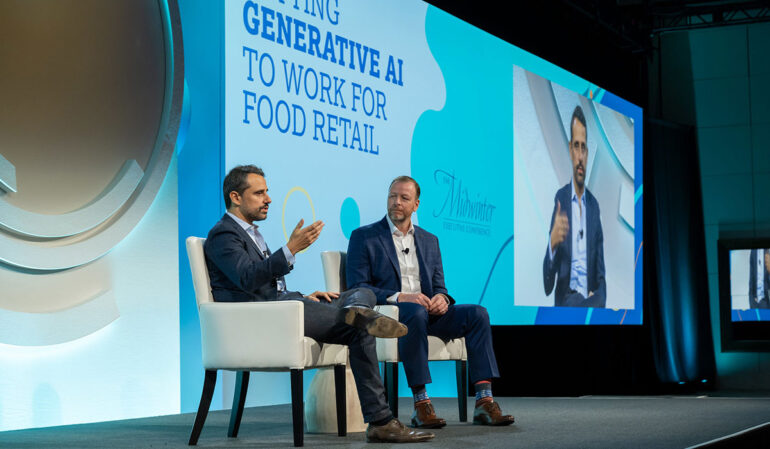By: Doug Baker, Vice President, Industry Relations, FMI Artificial intelligence (AI) is generating more questions than answers these days for the food industry. Senior leaders are striving to understand the opportunities and risks at a time when AI — including generative AI — is front and center in the business and media worlds. That is why FMI embedded the emerging technology topic into nearly all facets of our recently concluded annual Midwinter Executive Conference in Marco Island, Fla. The technology focus included education sessions, exhibits, B2B Exchanges, an FMItech Lounge, and a technology pitch competition. Senior leaders left with a deeper understanding of how to navigate the adoption of technologies that support key business imperatives such as supply chain, customer experience, e-commerce, on-shelf availability and sustainability. Making AI Work for Food Industry Needs The food industry needs to become more familiar with the benefits and risks of AI and tap into applications that make sense for its businesses, said Leslie Sarasin, FMI’s president and CEO, in a keynote session. “We simply must get more comfortable with our discomfort in talking with each other about artificial intelligence — its implications, challenges, limits, dangers and opportunities,” she said. The best path is to make sure AI serves the needs of the food industry, including with proper protections in place, she emphasized. Identifying How AI Can Add Value This year will mark a shift in how companies make progress with AI, said Google Cloud’s Jose Luis-Gomes, managing director, Retail and Consumer, during a Midwinter keynote session that I moderated. “2023 represented a mass-use-case mania,” he explained. “2024 is when we will try to drive scale and adoption.” He said companies should start with their P&Ls and their existing opportunities and problems. They can make progress through the auditing of their business and IT roadmaps to see how AI can add speed and deliver more value. He added, “organizations that adopt AI will develop competitive advantage.” Spotlighting New Tech Applications Tech companies of all sizes are vying to launch new solutions for this industry. An FMItech Pitch Competition at Midwinter featured three finalists presenting their food retail technology start-up solutions and attendees voting on their top choices. The winner was Augmodo, a technology solution that aims to augment the retail workforce by using AI and wearable cameras to improve ecommerce inventory and picking. The other two finalists were Grocery Shopii, a meal planning and recipe media tool, and Greenchoice, the first carbon-neutral online grocery marketplace. “Organizations that adopt AI will develop competitive advantage.” Eyeing a Faster Pace of Change As technology innovation accelerates, traditional food industry organizations face challenges to keep up. That was a key point from speaker Gary Hawkins, CEO and Founder of CART (Center for Advancing Retail & Technology), in a presentation called “Bionic Retail” during the Midwinter Lunch and Learn session. Hawkins said the exponential pace of change and growth of computer processing power create new opportunities but siloed organizational structures and a reticence to change make it hard for retail organizations to achieve all the benefits. He emphasized the opportunity for retailers to leverage technology to create their unique visions of the future of retail. Driving Education and Collaboration Food industry organizations need to consider the guidance provided by Midwinter speakers and develop their own roadmaps for success. Leaders should think boldly while making sure new technologies are handled in responsible ways. I look forward to seeing how all this plays out in 2024 and beyond. FMI will focus on driving the industry forward through advocacy, education and collaboration.
This content was originally published here.



